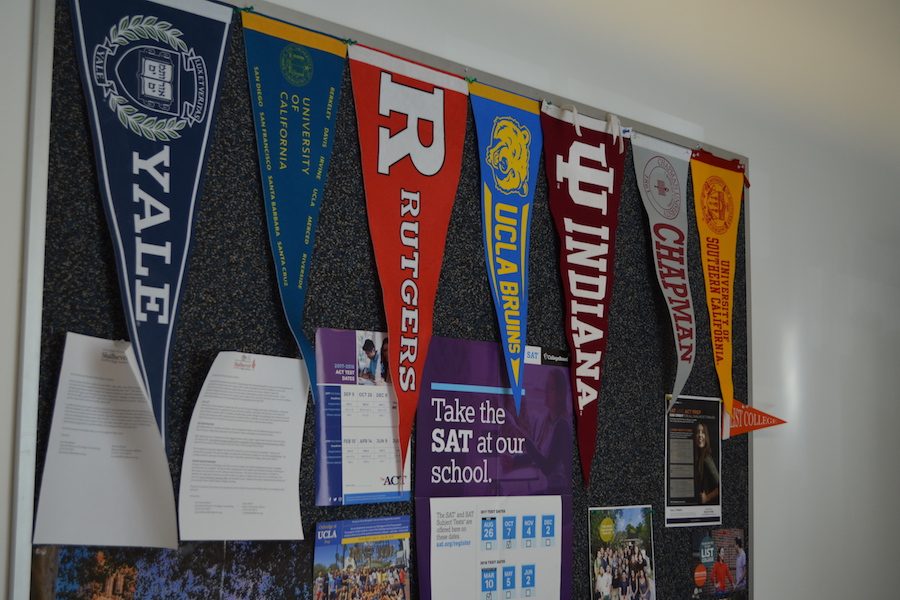College-bound students weigh how far to fly the coop
Top California schools are fewer and getting more competitive, and East Coast schools are more Jewish and more expensive. Family and personal considerations often prove decisive.
DISPERSION: College banners hang outside College Counselor Lisa Gruenbaum’s office, representing the diversity in the decisions kids make about where to go to college.
Every year, many Shalhevet graduates leave California to pursue college degrees on the East Coast, in the Midwest and other regions hundreds or thousands of miles from home. But some stay local.
But it is not as common nationwide. Of entering college freshmen in 2016, 38 percent attended college within 100 miles or less of their home, 15 percent within 51 to 100 miles and 30 percent within 101 to 500 miles, according to a national study conducted by the Higher Educational Research Institute at UCLA.
That leaves just 17 percent who went to school more than 500 miles away.
According to Aviva Walls, college counselor and Dean of Academic Affairs, 30 years ago most people did not go to college more than 200 miles away from the house they grew up in.
But those national averages do not match Shalhevet’s statistics. Of the 60 schools Shalhevet students have enrolled in in the last four years, only about 22 percent were in California. Forty-three percent were on the East Coast, and the rest were elsewhere in the U.S., plus a few in Canada and Israel, according to a list of colleges Head of College Counseling Ms. Lisa Gruenbaum gave the Boiling Point.
Yet significant numbers of Shalhevet graduates still opt for nearby schools like USC, Chapman University, UCs and Cal State schools, so they can see family every weekend, save money or stay in California simply because they like it here — or some combination of the three.
Students who are the oldest can stay close to younger siblings, and regardless of age, students can see family every weekend and save on food and living expenses, according to Ms. Lisa Gruenbaum.
In the class of 2015, there were 9 students who stayed in-state and 22 who left California after graduation. In 2016, 32 percent of students (14 out of 44) stayed local for college. Last year, just one quarter of 54 students stayed in-state after high school.
There are lots of reasons students leave Los Angeles, and even California. There is a higher density of highly-ranked schools on the East Coast and high-achieving students may want to attend a prestigious school, and those are simply too spread out for everyone to stay in-state for college.
With fewer colleges in-state than beyond, increasing competitiveness within California may force students out of state due when they’re not admitted to an in-state school. Students say there is also some stigma attached to staying local or going to a public state school, since most Shalhevet graduates go farther away.
These issues are on the mind of senior Sarina Finn, who is not applying to any schools in California.
“I think I would benefit from an experience that is not like my everyday life, and getting to know a new place,” said Sarina. “Getting to know a new city is cool, for me to become more worldly, and by staying in LA I would be going to the same mall, the same restaurants.
“Being away from your family allows you to grow and become truly independent,” she continued. “If I was in California I would be able to go back home if I have a problem, whereas if I’m on my own I don’t have a choice but to grow on my own.”
In addition, more East Coast schools have a good reputation for Jewish life on campus, among them NYU, Brandeis, Binghamton University and the University of Maryland — to name just a few.
Students may also want to fly the nest and gain independence by being in a new city on their own. But where does that leave those who, like most kids nationally, want to stay local?
Shalhevet senior Oren Rad said he is applying only to UC campuses, because it is important to his family for him to stay close to home and save money. Still, he isn’t sure why those are the two most important things and does not entirely understand the logic in “staying local.”
“If you have the money, going away for college is a great experience,” said Oren.
But Oren said if his parents were to let him go anywhere for college he is not sure what he would do — going to UCLA or SMC and then transferring has always been the plan.
“I trust my parents know what’s best, because they have more life experience,” Oren said.
He hopes to go to UCLA because he plans on attending medical school, and any type of grad school adds to the cost of tuition — so going to UCs or SMC first greatly cuts down the cost.
Another senior planning on staying in Los Angeles is Hila Machmali.
“I’m part of this bubble,” said Hila, who wants to stay close to her family for college. “I live at home with my family. We do our dinners every night and every Friday night we go to a family friend’s house, and if I go out of state I would really miss it.”
“I’ll definitely miss my friends,” Hila added.
But students also look down on staying close to home, she said. Because most of the “Top 50” schools and all of the Ivies are in the East, there is now an association with prestige and the east coast. Not to mention, most of those schools are private, which has an additionally strong association with prestige. And since California has fewer of those schools, some look down on staying local.
Hila has a love-hate, relationship with the idea of staying in California. She said the “shame” around staying local keeps her from loving staying local completely, but at the same time what the UCLA tour guides said happened to be much more appealing to her than what other guides at other schools said.
She liked the campus, their top-rated dorm food, and that UCLA is a well-known school and has credentials — like having sent the first-ever message on the internet to Stanford. Hila plans on majoring in mathematics and going into business or engineering.
Los Angeles students are not the only ones to struggle with home-versus-away.
Ms. Michelle Biller-Levy, the head of college counseling at Yeshiva of Flatbush in Brooklyn, N.Y., said some students want to stay close to family, and others may know they want to settle down in the city they grew up in, so it makes sense to become professionally established in that area by going to college and getting internships where they plan on living long-term.
But she said students do not always feel so positive about going to a CUNY school — New York City’s public university system that is similar to the UC system.
“There is somewhat of a stigma around high-achieving kids getting, ‘Oh, you’re just going to CUNY?’ I think there’s that sometimes,” Ms. Biller-Levy said. “We run into this issue of some of our more high-achieving students saying, ‘You know, I worked really hard for four years — I don’t want to end up going to CUNY where there is such a large range of students going there.’ “
If they’re not qualified to get into Barnard or Columbia, she asked, where does that leave them?
“What are your options then locally?” said Ms. Biller-Levy. “That can be a source of frustration for some of our students who want a real college experience. So a lot of kids apply to Macaulay. New York University has also gotten increasingly competitive.”
Still, she said, the stigma around staying in New York City is not that pervasive since it is so common.
Shalhevet college counselor Ms. Lisa Gruenbaum made similar observations, referring to the attitude of parents.
“It’s usually that at the end of the day family is more important and I want my child close to me because I feel like I can support them through college, help them through college,’” Ms. Gruenbaum said.
“And those families tend to think that any benefit the student is getting from being closer to their family, is greater than the benefits they would receive from earning their degree at an institution far away from home.”
A shift both Ms. Walls and Ms. Gruenbaum have noticed is that with the increasing competitiveness of UC schools due to their low cost and increasing prestige, it has become more difficult for students to be accepted. So Santa Monica College has become much more of an option, or students can go to a school far away if accepted.
Staying local doesn’t work for everyone.
“It’s getting harder now that all the California schools are so competitive,” Lisa said. “So I think that is hurting the situation because it is more likely that students who want to stay close to home will go to Santa Monica College with the hopes of transferring, as opposed to going straight to a four-year school. SMC is still a good system, but it’s only one system, so their options are more limited now.”
For Shalhevet students, the options for prestigious private schools in California are Stanford, USC, and the Claremont colleges. But with Stanford’s four-percent acceptance rate, it’s not exactly an option anyone can plan on.
Additionally, schools on the East Coast have the strongest Jewish communities.
The Claremont colleges, a consortium of five undergraduate liberal arts colleges and two graduate institutions, are extremely competitive as well. The consortium includes Claremont Mckenna, Pitzer, Pomona, Harvey Mudd and Scripps.
But those schools do not have as strong of a Jewish community (only 12 percent of all their undergraduates are Jewish according to Hillel) as a place like George Washington University (26 percent Jewish), the University of Maryland at College Park (20 percent Jewish), Brandeis (44 percent Jewish), Rutgers University, New Brunswick (18 percent Jewish) and the University of Pennsylvania (17 percent Jewish).
Senior David Khakshooy wants to leave home for college, but his parents want him to go to Santa Monica Community College and transfer to a UC. Of his 26 cousins, he says 24 of them took that route, most of them from public high schools.
“It wasn’t a choice for most of them,” David said, and they didn’t think about it since going to SMC was always the plan.
David said his parents would let him attend a UC straight out of high school, but he doesn’t think he can get into one. California state universities are an option, but his parents strongly prefer he go to SMC, because then he won’t be able to move into a dorm since those campuses don’t have any.
If he attends UCLA, he will be able to dorm, which his parents do not want. He said he wants the independence of living on his own.
“My parents want to force me to stay in California,” David said. “I’m still applying out of state, because maybe I can convince them. If not, maybe I’ll take a loan out and go, because they won’t pay for an out-of-state school.”
The numbers of kids flying the coop is increasing in New York as well as Los Angeles.
Ms. Biller-Levy said that when she attended Flatbush, not everyone was expected to go to college. This generation, everyone is expected to pursue a higher education. So she believes it is possible that in 10 or 15 years, an additional step will be taken where families are comfortable with students going out of state.
She has already been seeing in the last few years, she said.
“There are some students who assume that … going away has been taken off the table right off the bat,” said Ms. Biller-Levy. “But then you have students who don’t necessarily want to do that.”
For now, the trend has mostly stayed the same. She said out of a grade of 150 students, there are only a handful of kids — “I can count them on my two hands” — who are planning on leaving the state of New York.

Hannah Jannol was Editor-in-Chief of the Boiling Point during the 2017-2018 school year. Since then, she has attended The New School and written for their HerCampus chapter; edited obituaries for The Trace; written poetry for Eleven and a Half literary magazine, and run Instagram and Twitter for Uptown Stories. Her favorite parts of being on Boiling Point were production night and writing long-form features stories, many of which won awards from CSPA, Quill & Scroll and the American Jewish Press Association.











